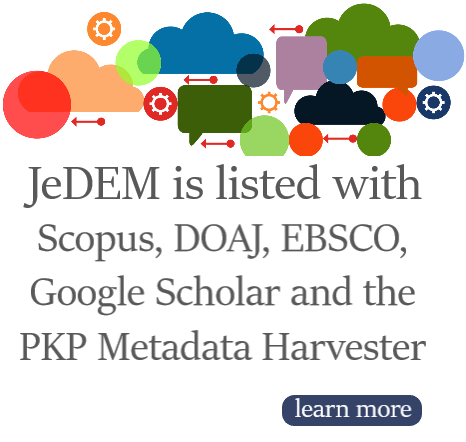Use of Social Media for Political Participation by Youths
DOI:
https://doi.org/10.29379/jedem.v12i1.585Keywords:
computer self-efficacy, perceived usefulness, perceived ease of use, political participation, social media use, Nigerian youthsAbstract
This study investigated use of social media for political participation among youths in Oyo state, Nigeria; specifically, the types of social media used for political participation, the types of political activities social media are used for, as well as factors influencing use of the media for political participation. Survey research design was adopted for the study. Data was collected through questionnaire from 322 youths in three Nigerian universities. Findings reveal that social media was highly used by the youths for political participation. Facebook (98.8%) was found to be the most used, followed by Whatsapp (93.8%), Instagram (60.2%), Twitter (55.3%), and Yahoo Messenger (50.9%) respectively. Majorly, the youths used social media to participate in political advocacy (95.3%), political campaigns (91.9%), communicating with politicians (90.7%), political discussions (87.3%), monitoring and reporting electoral malpractices (85.1%), public consultations (80.4%), joining interest groups that engage in lobbying (64.9%), blogging about political issues (64.9%), and writing letters to public officials (51.2%). Perceived usefulness, perceived ease of use, subjective norms, and computer self-efficacy significantly influence use of social media for political participation, which suggests that these factors could be considered when promoting use of social media for political participation among youths. Given the growing popularity and penetration of social media and the way they influence peoples’ lives, the empirical findings of this study add to understanding how and why social media use will function in motivating citizens to be involved in political activities.
Downloads
Metrics
Downloads
Published
How to Cite
Issue
Section
License
Copyright (c) 2020 Funmilola Omotayo

This work is licensed under a Creative Commons Attribution 3.0 Unported License.

JeDEM is a peer-reviewed, open-access journal (ISSN: 2075-9517). All journal content, except where otherwise noted, is licensed under the CC BY-NC 4.0 DEED Attribution-NonCommercial 4.0 International














